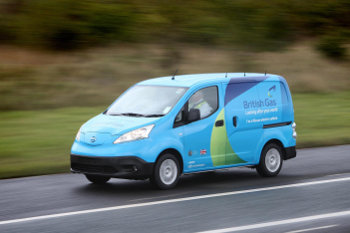
Manheim’s head of commercial vehicles believes that the June 2014 launch of the Nissan e-NV200 electric van, see here on extended trial with British Gas, could be a tipping point for electric vans.
With impeccable timing, given the smog blanketing much of the UK, vehicle auctioneers Manheim have declared that 2014 could be the tipping point for electric van adoption.
James Davis, head of commercial vehicles at Manheim, says that technical and economical hurdles remain for electric vans in the used market:
These vans were expensive to buy new and were often funded from major PLC marketing budgets to satisfy their ‘green’ agendas.
In the used market, a buyer has to justify their price premium versus tried, tested and trusted heavy oil technology; without the budget or turnover of the original PLC owner. Diesel will win the day for a long time yet, until LCV running costs and taxes are more closely linked to emissions.
Nervousness over longevity and battery lease agreements are also deterring buyers, says Davis, although occasional hybrid models have seen strong demand at auction; Davis cites two AshWoods Transit hybrid conversions, which sold for between 125% and 131% of their CAP book prices at a sale in late 2013.
However, Davis suggests that that tipping point could come this year:
“Looking ahead, the official launch of Nissan’s e-NV200 in June 2014 will be a major landmark in the eVan market. A volume fleet order, most likely from one of the PLC fleets currently on trial, will surely launch used electric OEM vans as a real alternative to fossil fuels, with a viable dealer and charging network to follow.”
Strangely enough, Davis’ views about the Nissan e-NV200 echo my own exactly — as I explained in a post on this site at the start of March.
I strongly believe that the van market is currently the most realistic target for volume sales of electric vehicles. Time will tell if I’m right, but frankly, the competition from other alternative fuels is pretty thin. Hydrogen and fuel cells are still too experimental and complex, while looking back, LPG might have been a good idea, but the economic advantages were only ever based on fuel duty rates, not underlying fuel costs, and as Manheim’s James Davis explains, the game is now nearly over:
“In our view, LPG is all but extinct among mainstream fleets. Operation, tank size and its position in the payload area, coupled with a fragmented refuelling network infrastructure, conspire against the technology.”
I’m bullish on electricity and believe that when combined with range-extender and hybrid technology, it’s a logical and complementary way for internal combustion engined vehicles to evolve, while retaining the practicality we all value so highly.
Indeed, I’ll go further and say that in a few short years, hybrid technology will become a standard feature on many new models — to the point that it isn’t even badged anymore. After all, I remember a time, not so long ago, when vehicle manufacturers badged their vehicles to advertise the presence fuel injection, catalytic converters and turbos (on diesel engines).
Today, any new car or van without these features wouldn’t be fit for purpose, and I’m pretty sure the same thing will happen with hybrid technologies.
